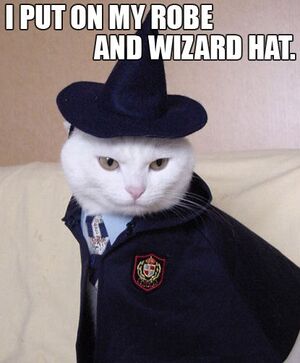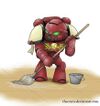Magic: Difference between revisions
No edit summary |
(forgot mah boldtext) |
||
| Line 3: | Line 3: | ||
''If you're looking for the card game, check [[Magic: The Gathering]]'' | ''If you're looking for the card game, check [[Magic: The Gathering]]'' | ||
A staple of fantasy fiction and settings is the presence of magic, a more or less mysterious supernatural force in the world that allows wizards, sorcerers, witches, and all manner of strange people or creatures to defy the laws of physics and do fantastic things. Magic, in some form or another, is present in a huge number of fantasy novels and game settings, but the particulars can vary massively from place to place. | A staple of fantasy fiction and settings is the presence of '''magic''', a more or less mysterious supernatural force in the world that allows wizards, sorcerers, witches, and all manner of strange people or creatures to defy the laws of physics and do fantastic things. Magic, in some form or another, is present in a huge number of fantasy novels and game settings, but the particulars can vary massively from place to place. | ||
In some settings, magic may be a fairly commonplace phenomenon, with universities dedicated to its studies and magical streetlights in major cities. In others, it could be mostly unknown, and may be (to most) the province of myths and legends instead of reality. The actual functioning of magic may also vary; sometimes a practicioner of magic may be able to create any effect they desire spontaneously, but in other implementations magic is seen solely as predefined spells. It may be that using magic requires years of careful study and accumulation of knowledge, or that the ability to use magic is an inherent ability an individual inherits or spontaneously develops, or of course some combination of the two. Variation between any of the extremes is possible. | In some settings, magic may be a fairly commonplace phenomenon, with universities dedicated to its studies and magical streetlights in major cities. In others, it could be mostly unknown, and may be (to most) the province of myths and legends instead of reality. The actual functioning of magic may also vary; sometimes a practicioner of magic may be able to create any effect they desire spontaneously, but in other implementations magic is seen solely as predefined spells. It may be that using magic requires years of careful study and accumulation of knowledge, or that the ability to use magic is an inherent ability an individual inherits or spontaneously develops, or of course some combination of the two. Variation between any of the extremes is possible. | ||
Revision as of 09:37, 3 November 2010

>
If you're looking for the card game, check Magic: The Gathering
A staple of fantasy fiction and settings is the presence of magic, a more or less mysterious supernatural force in the world that allows wizards, sorcerers, witches, and all manner of strange people or creatures to defy the laws of physics and do fantastic things. Magic, in some form or another, is present in a huge number of fantasy novels and game settings, but the particulars can vary massively from place to place.
In some settings, magic may be a fairly commonplace phenomenon, with universities dedicated to its studies and magical streetlights in major cities. In others, it could be mostly unknown, and may be (to most) the province of myths and legends instead of reality. The actual functioning of magic may also vary; sometimes a practicioner of magic may be able to create any effect they desire spontaneously, but in other implementations magic is seen solely as predefined spells. It may be that using magic requires years of careful study and accumulation of knowledge, or that the ability to use magic is an inherent ability an individual inherits or spontaneously develops, or of course some combination of the two. Variation between any of the extremes is possible.
Because of the prevalence of magic in fantasy, it is often invoked to explain any sort of nonsensical happening or violation of the laws of physics found in a story or game, even when it is not explicitly suggested to have a magical cause by the material in question, using the all-purpose expressions "a wizard did it" or "it's magic. I don't gotta explain shit." The presence of magic is also often brought up in response to complaints about apparently nonmagical violations of known science, the argument usually following along the lines of "you're in a setting where people can shoot fire out of their dicks, who cares if someone can balance on a cloud?"
Examples of Magic in Games
Magic in 3.5e
Magic in Dungeons and Dragons 3.5e is called the art by elves and other such nonsense by other such nonsensical creatures. It is similar to the weeaboo idea of chi/ki where magic is all around us like the force from Star Wars, like the holy gandalf in religion and the.... yeah you get the picture. Magic in 3.5e is everywhere like paedobear.
To cast spells you first need to know the spell (if it is an arcane spell) which makes sense - you can't differentiate and integral if you don't haz mathz. Divine spell casters have it easy though, their god/diety/imaginary friend lets them cast any spell if they have enough levels and if they ask really nicely in the morning.
Casting the spell takes "lots" of effort (seriously, magic users in D&D are physically weak) so they can only cast a certain number of spells from a certain casting difficulty per day.
Magic in 4e
In 4E, familiar spells from prior editions still exist, though many of them have disappeared. All in all, the spell selection is significantly smaller in 4E, with many spells (specifically exceedingly minor or extreme ones, like various cantrips and Wish/Prismatic Wall). In deed, in 4E, spells are less intricate and specific, and more straight-forward. This isn't to say that 4E is without familiar spells like Prestidigitation or non-combat spells like their utility spell for summoning up a mansion.
Another notable point in 4E magic is the fact that classes don't generally share spell lists anymore. For example, the Wizard and Sorcerer have wholly different selections of spells and class features. Spells in 4E are classified with powers, meaning a spellcaster is going to generally have about as many spells as a Fighter has special attacks, stances, and disciplines. They're also functionally similar, differing only in affect, but not in the usage of attack rolls to resolve the success of the spell. This has led to the prevalent criticism that "all classes in 4E are spellcasters," and the nickname "caster edition."
There's also rituals, which are more powerful magic that takes a while. They generally have advanced, out of-combat purposes and unlike most of the typical combat spells like those mentioned above, cost money for components and the like.
Magic The Warp in Dark Heresy
Unlike in 3.5e, where everything's colourful and cheery, trying to use ethereal powers in the 40,000 universe could get your "beautiful snowflake" soul stolen by nasty deamons you will then rape the shit out of your body and then defecate your eyeballs.
On the plus side, Psykers (as magic users are called) know very few powers (two at the start) in the game but can cast them whenever they want as long as they don't fail the casting roll.
